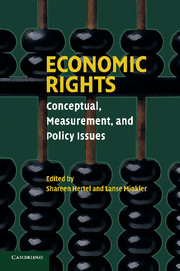Book contents
- Frontmatter
- Contents
- Contributors
- Acknowledgments
- 1 Economic Rights: The Terrain
- SECTION I CONCEPTS
- SECTION II MEASUREMENT
- SECTION III POLICY ISSUES
- 12 Economic Rights and Extraterritorial Obligations
- 13 International Obligations for Economic and Social Rights: The Case of the Millennium Development Goal Eight
- 14 The United States and International Economic Rights: Law, Social Reality, and Political Choice
- 15 Public Policy and Economic Rights in Ghana and Uganda
- 16 Human Rights as Instruments of Emancipation and Economic Development
- 17 Worker Rights and Economic Development: The Cases of Occupational Safety and Health and Child Labor
- APPENDIX 1 Universal Declaration of Human Rights
- APPENDIX 2 International Covenant on Economic, Social, and Cultural Rights
- Index
- References
12 - Economic Rights and Extraterritorial Obligations
Published online by Cambridge University Press: 18 December 2009
- Frontmatter
- Contents
- Contributors
- Acknowledgments
- 1 Economic Rights: The Terrain
- SECTION I CONCEPTS
- SECTION II MEASUREMENT
- SECTION III POLICY ISSUES
- 12 Economic Rights and Extraterritorial Obligations
- 13 International Obligations for Economic and Social Rights: The Case of the Millennium Development Goal Eight
- 14 The United States and International Economic Rights: Law, Social Reality, and Political Choice
- 15 Public Policy and Economic Rights in Ghana and Uganda
- 16 Human Rights as Instruments of Emancipation and Economic Development
- 17 Worker Rights and Economic Development: The Cases of Occupational Safety and Health and Child Labor
- APPENDIX 1 Universal Declaration of Human Rights
- APPENDIX 2 International Covenant on Economic, Social, and Cultural Rights
- Index
- References
Summary
INTRODUCTION
One of the great disappointments concerning human rights is the way in which these rights are declared to be “universal,” at the same time that the protection of those rights (and even responsibility for the commission of human rights violations) has been severely limited by territorial considerations. In this chapter, we argue that this is an unfortunate misreading of international human rights law. A person's home state is certainly the first place to look to in terms of the protection of economic rights – and all other human rights as well. This point is not being challenged. What is being challenged is the refusal to look any further than this, notwithstanding the dictates of international human rights law.
The term “extraterritorial” effect/application/obligation in international law refers to acts that are taken by one actor (state) that have some kind of effect within another country's territory with or without this second country's implicit or explicit agreement. Extraterritoriality within international human rights law, then, concerns actions or omissions by one state that have an effect on the human rights of individuals in another state – with or without this other state's agreement. This effect may be positive or negative, in that such actions or omissions by foreign states may contribute positively to the enjoyment of human rights; or alternatively, they may result in a deteriorated human rights situation, and even human rights violations.
- Type
- Chapter
- Information
- Economic RightsConceptual, Measurement, and Policy Issues, pp. 267 - 283Publisher: Cambridge University PressPrint publication year: 2007
References
- 6
- Cited by



